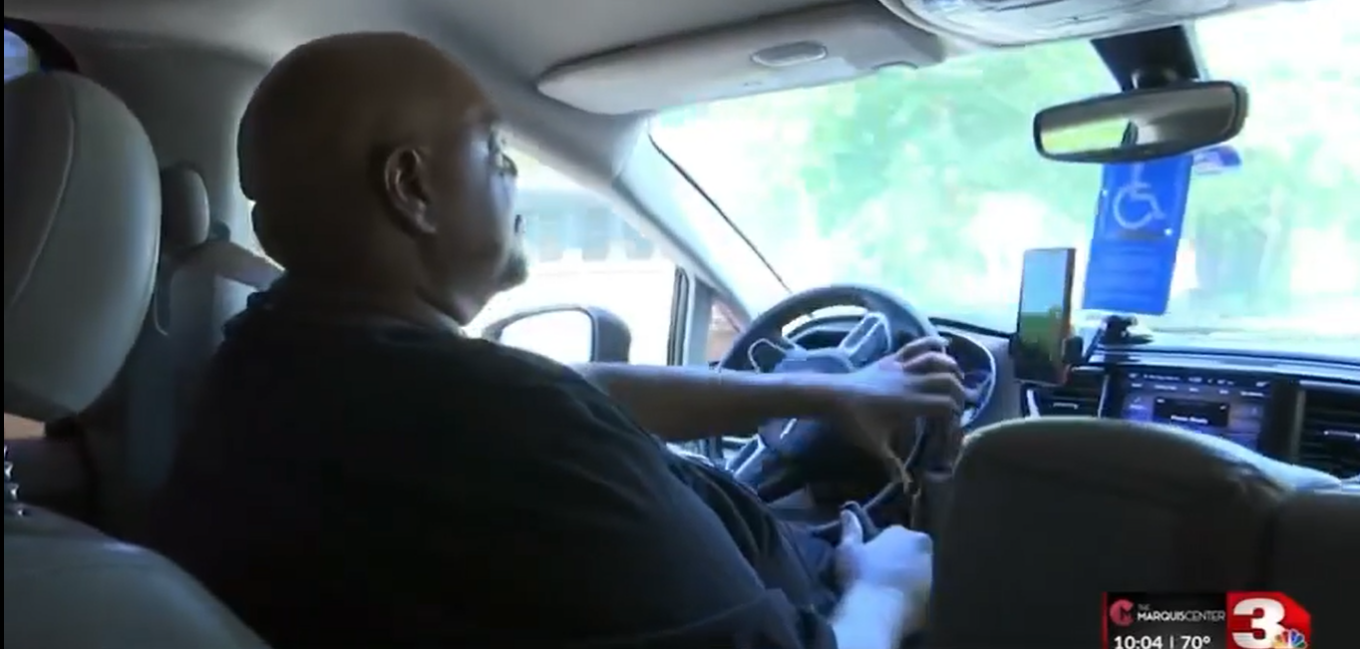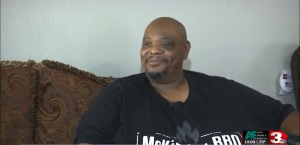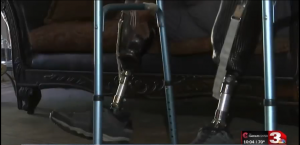Photo Credit: Markeshia Jackson TV/Facebook.com
When a doctor says that it might be necessary to lose both legs to save your life, everything would likely come to a screeching halt. For Kelvin Hall, it was the first step toward a life that started to speed up.
Hall is a double amputee who earns a living by driving for a rideshare company.
“One guy told me that being in a Lyft and being in an Uber is like being at the bar because he gets in and complains like he does with a bartender,” recounts Hall. “I said, ‘God is still good, God is still in control of everything, and I’m driving and don’t even have legs.” [[1]]
Hall says that when most people see him in his hometown of Wichita Falls, they believe he is a veteran. When they ask if he’s been in a war, he just shakes his head and says he was hardheaded.
Complications with diabetes eventually led to doctors needing to amputate both legs to save his life.
Hall Stands Tall with the Help of Two Prosthetics
Hall credits his father for the attitude that he has in life. “My dad always got up and went to work, and watching him get up even through pain and stuff, or if he was hurting, he never complained. Me and my brothers adopted that.”
Although he has two prosthetics that help him stand tall, Hall also credits the strength of his faith for helping him get through difficult times.
“Every day is a brand-new day,” said Hall. “This day you can’t get back… we can’t get back because every moment is a new one. Time doesn’t go around in circles. It is a straight line.”
When Hall isn’t driving, he’s in his office building or cleaning firearms for local agencies. He says that how we react and decide to move forward is what makes a big difference in one's life.
“Some things are out of control,” he says, “so there’s no sense in getting upset with it. My legs got cut off… they’re not growing back, so you overcome and adapt.”
That’s why Hall’s best advice is relatively straightforward: put your best foot forward and try to beat the odds.
Limb Loss Is a Significant and Underreported Issue in the United States
About two million people are currently living in the United States with some form of limb loss. Most people have diabetes or peripheral arterial disease that leads to this issue, but it can also happen because of a cancer diagnosis. [[2]]
The hospital costs associated with patient amputation total more than $8.3 billion per year in the United States. About 185,000 people have this surgery annually.
Almost half of the people who receive an amputation because of vascular disease pass away within five years of the operation. That’s a higher rate than some of today’s most prevalent cancers.
Hall has a positive attitude, but maintaining it isn't always easy. "Being sick to me is you can't move, can't do anything, so if I feel just a little something, to me you can still move, you can still go, you can still go do what you have to do," he said. "I don't really know how to act sick."
About half of the people who deal with limb loss daily don’t belong to an amputee group, but wish they did. Leslie Green hosts multiple communities for those in this situation for Hanger Clinics. “I’m surprised the number’s not bigger,” she said.
Many people feel overwhelmed to participate in conversations about their health, especially right after they start their adjustment. People learn to adapt, but it takes time to establish a new normal routine.
How to Find the Right Levels of Support
Hall supports his community by offering advice, driving to earn some extra cash, and living an inspirational life. Some people haven’t completed their transition or are looking for a group that provides essential support.
The first place is to work with an organization like the Amputee Coalition. You can find a searchable list of groups in your area that could help you or someone you know begin this journey.
Green suggests that people avoid saying that they’re looking for a “support group.” She prefers the term “resource community.”
"Support indicates weakness or neediness," said Green. "We don't just discuss problems. We build relationships and empower people."
Including social workers, physical therapists, and prosthetists is vital in the conversation. These professionals can offer meaningful feedback that leads people to a great space.
Green even suggests "shopping around" for the right option. You don't need to share or introduce yourself if you've never attended a session.
Kelvin Hall is proof that life can be positive and meaningful, even when enormous challenges exist.
When you can find a way to push through and overcome, you don't just make yourself stronger, you're also creating a stronger community.
References:
[[1]] Local double amputee living an inspirational life (texomashomepage.com); [[2]] Limb Loss Statistics - Amputee Coalition (amputee-coalition.org)














